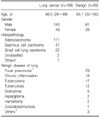Abstract
Background
The main goal of this study was to evaluate the diagnostic efficacy of reverse transcription-nested polymerase chain reaction (RT-nested PCR) in bronchial washing fluid with MAGE A1-6 common primers for the detection of lung cancers invisible by bronchoscopy.
Methods
To determine the expression of MAGE A1-6 gene in 189 lung cancers diagnosed by conventional fluoroscopy-guided lung biopsy and 89 cancer-free controls, RT-nested PCR was performed in bronchial washing specimens. We analyzed MAGE A1-6 RT-nested PCR data according to tumor histology, stage, size, and compared them with cytological data.
Results
189 patients (111 cases in adenocarcinoma, 47 cases in squamous cell carcinoma, 22 cases in small cell lung carcinoma, and 9 cases in other cancers) and 89 benign patients were investigated. The expression of MAGE was performed by nested RT-PCR using common MAGE primer. Among 189 cancer patients, the expression rate of MAGE was 49.2%, and the positive predictive value was 89.4%. However, the expression rate of MAGE in patients with benign lesions was 12.4%. In peripheral lung cancer, the positive rate of MAGE expression was 57.4% in squamous cell carcinoma, 44.1% in adenocarcinoma and 59.1% in small cell lung cancer. Whereas the expression rate of bronchial washing cytology in peripheral lung cancer was 9.0% (p=0.011).
Figures and Tables
Table 3
Expression rate of MAGE in bronchial washing according to the histological types in lung cancer

Acknowledgements
This research was supported by a grant of Yeungnam University Medical Center (2004).
References
1. Henschke CI, McCauley DI, Yankelevitz DF, Naidich DP, McGuinness G, Miettinen OS, et al. Early Lung Cancer Action Project: overall design and findings from baseline screening. Lancet. 1999. 354:99–105.
2. Manhire A, Charig M, Clelland C, Gleeson F, Miller R, Moss H, et al. Guidelines for radiologically guided lung biopsy. Thorax. 2003. 58:920–936.
3. Yamagami T, Iida S, Kato T, Tanaka O, Nishimura T. Combining fine-needle aspiration and core biopsy under CT fluoroscopy guidance: a better way to treat patients with lung nodules? AJR Am J Roentgenol. 2003. 180:811–815.
4. Heck SL, Blom P, Berstad A. Accuracy and complications in computed tomography fluoroscopy-guided needle biopsies of lung masses. Eur Radiol. 2006. 16:1387–1392.
5. Park JW, Kwon TK, Kim IH, Sohn SS, Kim YS, Kim CI, et al. A new strategy for the diagnosis of MAGE-expressing cancers. J Immunol Methods. 2002. 266:79–86.
6. Jeon CH, Lee SC, Hyun DS, Hong SI, Hong YJ, Chang YH, et al. Evaluation of sensitivity and specificity of MAGE A1-6 RT-nested PCR as a cancer detection method. Korean J Lab Med. 2003. 23:357–362.
7. Jheon S, Hyun DS, Lee SC, Yoon GS, Jeon CH, Park JW, et al. Lung cancer detection by a RT-nested PCR using MAGE A1--6 common primers. Lung Cancer. 2004. 43:29–37.
8. Kim H, Kim SJ, Lee SH, Seong HS, Lee KO, Jeon CH, et al. Usefulness of melanoma antigen (MAGE) gene analysis in tissue samples from percutaneous needle aspiration biopsy of suspected lung cancer lesions. Lung Cancer. 2010. 69:284–288.
9. De Smet C, De Backer O, Faraoni I, Lurquin C, Brasseur F, Boon T. The activation of human gene MAGE-1 in tumor cells is correlated with genome-wide demethylation. Proc Natl Acad Sci USA. 1996. 93:7149–7153.
10. Narayan A, Ji W, Zhang XY, Marrogi A, Graff JR, Baylin SB, et al. Hypomethylation of pericentromeric DNA in breast adenocarcinomas. Int J Cancer. 1998. 77:833–838.
11. Lin CH, Hsieh SY, Sheen IS, Lee WC, Chen TC, Shyu WC, et al. Genome-wide hypomethylation in hepatocellular carcinogenesis. Cancer Res. 2001. 61:4238–4243.
12. Jang SJ, Soria JC, Wang L, Hassan KA, Morice RC, Walsh GL, et al. Activation of melanoma antigen tumor antigens occurs early in lung carcinogenesis. Cancer Res. 2001. 61:7959–7963.
13. Weynants P, Lethé B, Brasseur F, Marchand M, Boon T. Expression of mage genes by non-small-cell lung carcinomas. Int J Cancer. 1994. 56:826–829.
14. Lee SJ, Yun MJ, Lee ST, Oh HJ, Song SH, Sohn I, et al. The clinical implication of MAGE gene detection in bronchial washing fluid in routine practice. Tuberc Respir Dis. 2010. 69:442–449.
15. Fischer C, Gudat F, Stulz P, Noppen C, Schaefer C, Zajac P, et al. High expression of MAGE-3 protein in squamous-cell lung carcinoma. Int J Cancer. 1997. 71:1119–1121.
16. Tajima K, Obata Y, Tamaki H, Yoshida M, Chen YT, Scanlan MJ, et al. Expression of cancer/testis (CT) antigens in lung cancer. Lung Cancer. 2003. 42:23–33.
17. Traversari C, Meazza R, Coppolecchia M, Basso S, Verrecchia A, van der Bruggen P, et al. IFN-gamma gene transfer restores HLA-class I expression and MAGE-3 antigen presentation to CTL in HLA-deficient small cell lung cancer. Gene Ther. 1997. 4:1029–1035.
18. Shin KC, Lee SJ, Kim KJ, Lee JW, Kim HJ, Chung JH, et al. The expression of melanoma antigen encoding gene in lung cancer. Korean J Med. 2005. 68:647–655.
19. Kim HR, Kim TH, Chung JH, Yoon HI, Lee CT, Kang CH, et al. The detection of peripheral lung cancer by MAGE A1-6 RT-nested PCR in bronchial washing specimens. Lung Cancer. 2009. 65:166–169.
20. Kim S, Kim H, Kwon OJ, Chung MP, Suh GY, Koh WJ, et al. The utility of MAGE gene detection in bronchial washing fluid for patients with peripheral NSCLC. Tuberc Respir Dis. 2008. 64:15–21.
21. Lee SJ, Yun MJ, Lee ST, Oh HJ, Song SH, Sohn I, et al. The clinical implication of MAGE gene detection in bronchial washing fluid in routine practice. Tuberc Respir Dis. 2010. 69:442–449.
22. Lee YJ, Lee JH, Lee JC, Lee KH. Expression of MAGE A 1-6 and SSX 1-9 genes in the sputum and cancer tissue of the lung cancer patients. Tuberc Respir Dis. 2011. 70:315–322.
23. Becker JC, Gillitzer R, Bröcker EB. A member of the melanoma antigen-encoding gene (MAGE) family is expressed in human skin during wound healing. Int J Cancer. 1994. 58:346–348.




 PDF
PDF ePub
ePub Citation
Citation Print
Print







 XML Download
XML Download